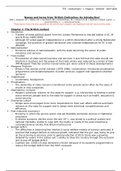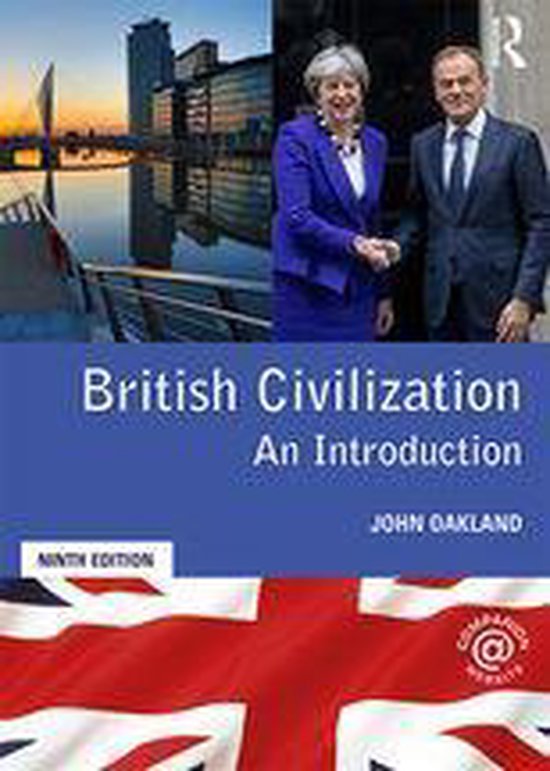TTK – UAntwerpen – L. Magnus – CHUKUS – 2019-2020
Names and terms from ‘British Civilisation: An Introduction’
ENG = England | W = Wales | SC = Scotland | GB = Great Britain | IR = Ireland | N-IR = Northern Ireland | gvt(s). =
government(s) | c. = century/centuries
These terms (from the blue squares at the end of each chapter) are important and will come on the exam
Chapter 1: The British context
Devolution
o Transfer of some political power from the London Parliament to elected bodies in SC, W
and N-IR (by 1998-1999)
o Although SC voted against independence in a 2014 referendum after a strong Nationalist
campaign, the question of greater devolution and ultimate independence for SC is still
debated
Nationalisation
o Economic policies of nationalisation, with the state becoming the owner of public
industries and services
Free market
o Privatisation of state-owned business and services; it was felt that the state should not
interfere in business and the power of the trade unions was reduced by a series of laws
(PM Margaret Thatcher and her Conservative gvt. were central to these developments)
Margaret Thatcher
o Britain’s first woman prime minister (1979-1990); conservative; introduced privatisation
programmes and denationalisation of public services; support and opposition (divided
opinions)
Yobbishness
o Loutishness, hooliganism
Privatisation
o The ownership of state concerns transferred to the private sector often by the sales of
shares in new companies
Dependency (culture)
o People’s automatic reliance on the state for support, e.g. intervention & funding in public
social services; people look to the state for support in areas such as health, education &
social security
Enterprise culture
o People were encouraged to be more responsible for their own affairs without automatic
reliance on the state for support and to adopt more individual competitiveness and
efficiency
Post-industrial (economy)
o Economy in which the service sector and job flexibility dominate; decline in traditional
certainties
o A relative economic decline since the late 19 th c. was joined to a political system and
national mentality unable to cope with the reality or needs of the post-industrial &
culturally diverse society that Britain had become
Budget deficit
o The difficulties in balancing free market & social welfare models of society continued. It
seemed that budget deficits & reduced growth indicated that the gvt. was losing its grip
on the economy & services; prior to general election of 2010, there was a growing
disbelief by voters in the Labour gvt.’s ability to steer the country through the recession
and to pay off budget deficit.
o Coalition gvt. (2010-15) also attracted criticism because of its austerity programmes to
reduce the budget deficit from the 2007 recession.
1
, TTK – UAntwerpen – L. Magnus – CHUKUS – 2019-2020
Lib Dems
o Liberal Democrats; tried to break into the two-party tradition
Insular
o International respondents’ replies to questionnaires often reveal stereotypical perceptions
about Britain and its people. They tend to see the British e.g. as close-minded, insular,
conventional & backward-looking with an exaggerated respect for their history &
traditions; supposed insular & conservative mentalities of island peoples
o Brexit: UK may become isolated, insular, inward-looking country with less influence in the
world
Pragmatic
o Some historians have argued that Britain has developed in a gradualist, evolutionary &
pragmatic manner, where common-sense change was accepted if it worked; Britain’s
historical growth & structural change may have been guided by pragmatism, common
sense & experience of what works in practice, rather than by FML arrangements &
theories.
Deference (= submission/passivity)
o Divisions in British society suggest a decline in the traditional deference to authority &
support for national institutions
Conservatism
o Supposed conservative mentalities of island peoples, with their preference for traditional
habits & institutions, orderly progress & distrust of sudden change
o Conservative party = centre-right
Inner-city
o Disparities between affluent & economically depressed regions throughout the country
(including the crime, decay & social deprivation found in many inner-city & rural
locations) create division in British society
Diversity
o In conventional accounts of British history, descendants of early immigrants over time
collectively created foundations for a multi-ethnic UK population with mixed identities &
cultures. Various degrees of inter-breeding between newcomers & natives produced
further diversity.
Consensus
o Divisions in British society suggest a decline in consensus views
o Consensus decision-making is a group decision-making process in which group members
develop and agree to support a decision in the best interest of the whole group or
common goal. Consensus may be defined professionally as an acceptable resolution, one
that can be supported, even if not the "favourite" of each individual
Euro
o While the eurozone stagnated, Britain emerged strongly from its 2007-10 recession; the
Maastricht treaty provided for the introduction of a common European currency (the euro)
Pluralism
o Classical pluralism is the view that politics and decision making are located mostly in the
framework of gvt., but that many non-governmental groups use their resources to exert
influence
Ethnic
o In conventional accounts of British history, descendants of early immigrants over time
collectively created foundations for a multi-ethnic UK population with mixed identities &
cultures.
Nostalgia
2
, TTK – UAntwerpen – L. Magnus – CHUKUS – 2019-2020
o Contemporary society often measured against an assumed earlier, more positive history.
However, the past in Britain was not as idyllic as is sometimes nostalgically imagined;
nostalgia for an assumed ideal past causes difficulties for progress, the evolution of social
structures & the solving of the nation’s problems
Autonomy
o Demands for greater autonomy create division in British society
Modernisation
o Tension between presumed tradition & attempts at modernisation/change
Myth
o The myth of a golden age and older patterns of social behaviour still hold considerable
romantic attraction for many Britons
Nonconformist
o Britons are now more nonconformist, multi-ethnic, secular & individualistic than in the
past
Evolutionary
o It might seem that the British story involves a confused & haphazard history of often
unforeseen events, rather than purposeful action. Yet some historians have argued that
Britain has developed in a gradualist, evolutionary & pragmatic manner, where common-
sense change was accepted if it worked; development of a British way of life & British
gvt., social structures, economic relationships & law has supposedly been due to
evolutionary responses to changing circumstances, based on shared values, tolerance & a
common understanding of rights & duties.
Neo-liberal
o Free market or neo-liberal economic programmes
Hierarchies
o Power hierarchy: top-down bottom-up policies
Grassroots
o A grassroots movement is one which uses the people in a given district, region, or
community as the basis for a political or economic movement; grassroots movements and
organizations use collective action from the local level to effect change at the local,
regional, national, or international level; associated with bottom-up, rather than top-down
decision making, and are sometimes considered more natural or spontaneous than more
traditional power structures
Homogeneous
o Some immigrant groups were genetically and geographically isolated for centuries
o While the country may give an impression of homogeneous behaviour in some respects,
there are divisions.
Inclusive
o In the Labour Party’s early years in gvt., it attempted (not without opposition) to
modernise Britain by supposedly creating a ‘new, young and inclusive’ society
Apathetic
o Tolerant civic image has suffered: Britons seem to have become more self-contained and
unwilling to spend time on activities that they feel they cannot influence; membership of
political parties has declined steeply & local community work is no longer attractive for
many Essential question remains whether such negative & apathetic images of
contemporary Britain are widespread & representative of the whole society, or the result
of occasional ‘moral panics’ often generated by an intrusive media & social commentators
Dissent
3
, TTK – UAntwerpen – L. Magnus – CHUKUS – 2019-2020
o State structures, such as the monarchy, gvt., the Church, Parliament and the law,
developed slowly & unevenly, rather than by long-term planned change, and there were
periods of upheaval & ideological conflict, such as social dissent (onenigheid/verdeeldheid).
o Competing pressures, dissension, & cultural & social fragmentation are arguably more
prominent in contemporary Britain than a shared set of beliefs & a common core.
Micro-managing
o The powerful state in recent years has intruded further into people’s lives, micro-
managing & overseeing more of their lives, work, data records & leisure
Celebrity
o Celebrity worship constitutes new patterns of behaviour; 88% believed that the cult of
celebrity had helped to make Britain a coarser, cruder society
CCTV
o CCTV (closed-circuit television) is a TV system in which signals are not publicly distributed
but are monitored, primarily for surveillance and security purposes. CCTV is finding
increasing use in law-enforcement, for everything from traffic observation (and
automated ticketing) to observation of high-crime areas or neighbourhoods. Such use of
CCTV technology has fuelled privacy concerns in many parts of the world, particularly in
those areas in the UK and Europe where it has become a routine part of police procedure.
Vandalism
o In opposition to the tolerant civic image that most people have of Britons
Council tax
o Council Tax is a local taxation system used in ENG, SC and W. It is a tax on domestic
property.
Globalised
o The structures & philosophies of British civic statehood have often been imitated by other
countries or exported abroad through the creation of a global empire from the 16 th c. and
a commercial need to build world markets for British goods.
o Development of British state and its empire was aided by increasing economic & military
prowess, so that by the 19th c. the country had become a dominant industrial & political
world power; main player in developing Western civic principles
o Globalised debates of 21st c., from which it cannot isolate itself as it did at some periods in
its earlier history
Pensions
o Sharply-growing concerns about pensions, social security & benefits; personal economic
concern frequently appearing on poll lists, reflecting individual respondents’ conditions;
although the UK was growing in 2014 & 2015, some people on low wages were not
benefitting from the national economic improvement: the issue of pensions & social
security have advanced because of difficulties facing pension provision in Britain, people’s
fears about their finances in old age & concern about an ageing population
Celtic
o From about 600 BC – AD 1066, the islands experienced successive settlement & invasion
patterns from peoples who originated in mainland Europe, such as Celtic groups.
Various degrees of interbreeding: assumed majority Celtic areas are more genetically
diverse than generally thought.
Chapter 2: The country
Defra
o The Department for the Environment, Food and Rural Affairs is responsible for agriculture,
fisheries, environmental protection and rural communities in the UK; develops land policy
4





